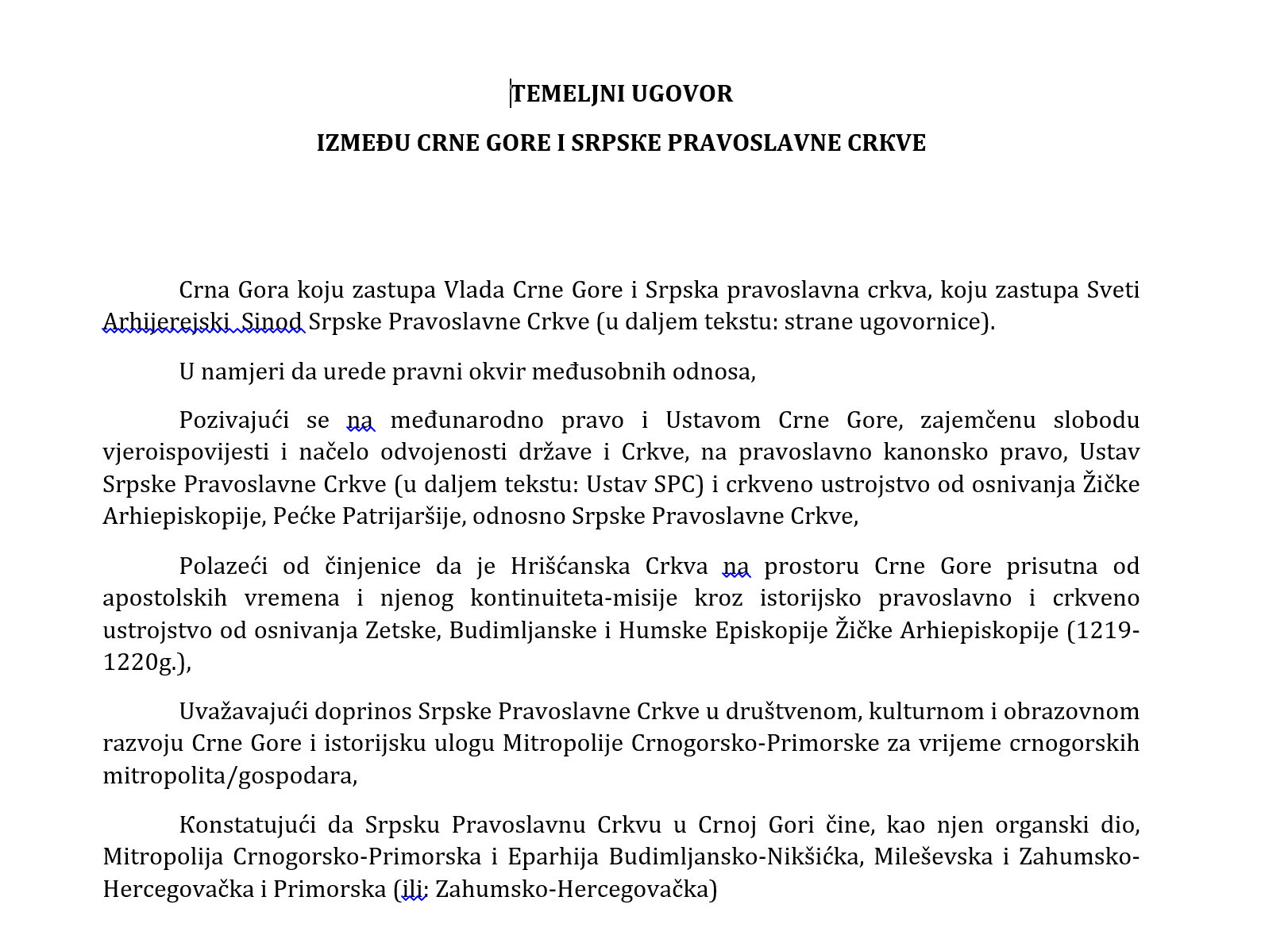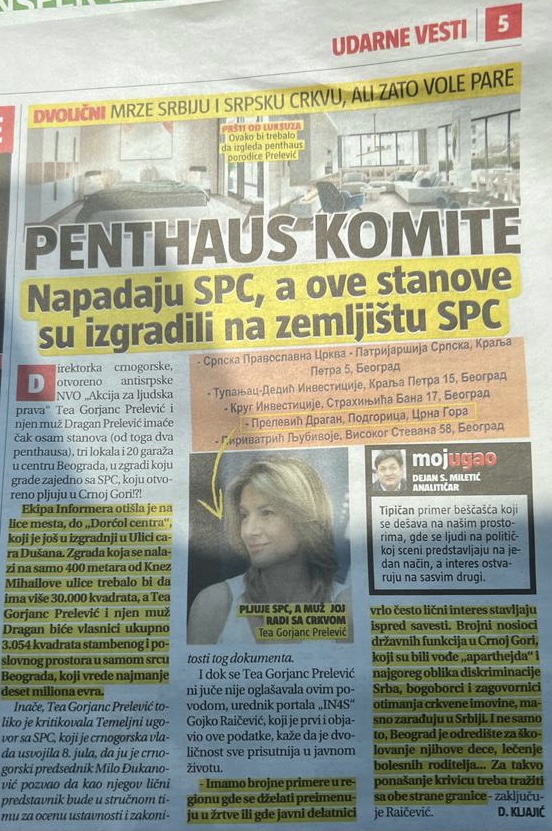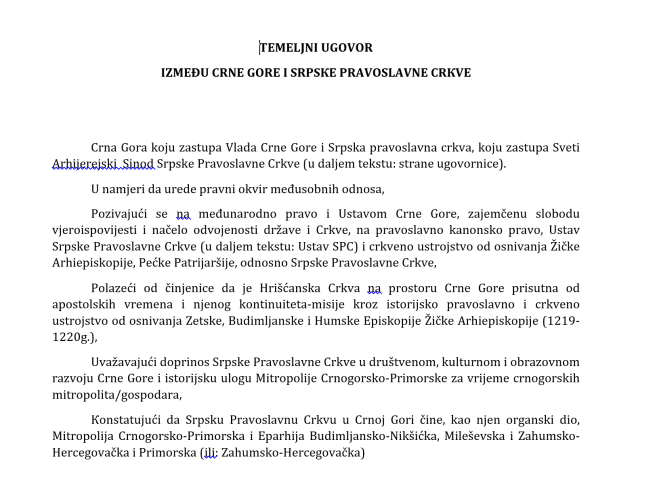
HUMAN RIGHTS ACTION DELIVERED PROPOSALS FOR AMENDING THE PROVISIONS OF THE BASIC AGREEMENT OF MONTENEGRO WITH THE SERBIAN ORTHODOX CHURCH TO THE PRESIDENT OF MONTENEGRO AND PRIME MINISTER
26/07/2022
LAWSUITS AGAINST A SMEAR CAMPAIGN
05/08/2022HUMAN RIGHTS ACTION’S COMMENT ON THE REFUSAL OF THE PRIME MINISTER’S CABINET TO AMEND THE PROVISIONS OF THE BASIC AGREEMENT

The Cabinet of the Prime Minister of Montenegro (hereinafter referred to as: “the Cabinet”) has publicly announced that all the remarks submitted regarding the draft version of the Basic Agreement between Montenegro and the Serbian Orthodox Church (SOC) have been rejected.
It also expressed its surprise at the public’s interest in this agreement (!), even though it involves by far the most numerous religious community in Montenegro, with great political influence, and the agreement has already resulted in protests and the signing of a petition by citizens. Through its analysis and comments on the draft agreement, the Human Rights Action (HRA) tried to contribute to bringing the issue back into the framework of the legal debate in order to reduce, among other things, tensions in the society.
All in all, the Cabinet’s decision to reject all expert remarks on the inconsistency of the provisions of the Agreement with the legal order of Montenegro can be summarised the following way: since it involves an issue that is “formally and legally marginal”, the Basic Agreement will be concluded without any changes, and its provisions can be annulled at a later date by the court.
It is true that provisions can be annulled. The Law on Postponement of Regular Elections was also annulled by the Constitutional Court, although the same Prime Minister’s Government previously rejected warnings that it was unconstitutional. But it is also true that divisions that were caused by this agreement can only deepen as a result of such a bad text. So the adoption of this version of the Agreement is, to say the least, irresponsible.
Of course, the fact that the Government is bound by the Constitution and the law when concluding agreements (as well as when performing other actions) is a fundamental issue of the rule of law, i.e. the division of power in the state, and is in no way marginal. The question must be raised about the responsibility and motives of the government that rejects timely expert legal warnings regarding the acts it is about to pass.
The Cabinet did not respond at all to half of the remarks submitted by the HRA, including two that we found particularly controversial: that religious education is provided for differently than in the current laws, and that the Agreement limits the right to appeal to the court in the process of making disciplinary decisions.
The answers that were given were vague to say the least, while some were openly frivolous.
It was not explained on the basis of which law the SOC is granted public powers, or which powers these are. The government cannot grant such powers by way of an agreement. None of the agreements concluded with other religious communities in Montenegro guarantees public law powers.
Regarding the illegal prohibition of taking security measures on the premises owned by the SOC without a “prior approval” of the church authorities – as stated in the text of the Agreement – the Cabinet said that the “meaning” of the provision is that the religious community should only be “notified” of the measures, that in practice it would also imply “subsequent notification”, and that any different interpretation would be contrary to mandatory regulations and would therefore be null and void. Our colleague Bracanović, whose comments were also ignored by the Cabinet, said that this term from the Agreement was “justifiably criticised, to a degree” and that it is “insufficiently precise”. Why has the term not been changed, then, instead of frivolously assuming that, in practice, the words “prior approval” will mean “subsequent notification”?
The HRA will continue to insist on the right of the public to criticise the work of the Government for the purpose of establishing the rule of law, regardless of the clear disparagement of our contribution by the top of the Government, and despite the pressures we are being exposed to because of our criticisms.
* * *
From the very beginning, our remarks were treated – first by the Minister of Justice, and then by the Prime Minister – as political, and not legal arguments. Despite the fact that we have submitted specific proposals on how to improve the text of the Agreement, the Prime Minister said that “he did not receive any legal arguments”.
Unfortunately, the Cabinet of Mr. Abazović approached the remarks on the Draft Agreement as frivolously as it did the process of its drafting. The Cabinet did not respond to the remarks we have provided regarding the Draft Agreement between the Government of Montenegro and the Serbian Orthodox Church (SOC).
We recall that we have emphasised, as particularly controversial, the provisions that:
– Guarantee public law powers to the SOC;
– Promise that security measures in buildings and other premises owned by the SOC will not be applied without the consent of the church authorities;
– Restrict the right to appeal to the court in the process of making decisions of a disciplinary nature, and
– Provide for religious education in a way that is different from that which is provided in the law.
The Government’s reply addressed only two of these four questions, and it did so in a politically imaginative and imprecise manner, uncharacteristic of the legal science.
Public law powers
In relation to public law powers, it should be noted that our positive legislation does not explicitly prescribe what public law powers are. In this sense, our statements – that, according to the statutory provisions, holders of public powers can only be state authorities, state administration authorities, local self-government authorities, local government authorities, institutions and other entities that exercise public powers (public authorities), which must be established by law – were ignored. The Cabinet did not explain, nor can it explain, how the state can guarantee the exercise of public law powers to a religious community (SPC) in an agreement, or by which law the SOC was founded.
It is stated in the replies of the Prime Minister’s Cabinet that public powers are granted only by law. We completely agree with this. However, said position is contradictory to the Basic Agreement, which guarantees the church the exercise of public law powers regardless of the fact that no law has granted the church such powers. Therefore, if public powers can be entrusted only by law, it is indisputable that the executive power cannot guarantee the exercise of those powers to any subject to which they were not entrusted by law.
We also agree with the position of the Prime Minister’s Cabinet that any exercise of these powers must be carried out in accordance with the legal order of the state of Montenegro, as no other way to do it is allowed. However, the entrustment and exercise of public powers cannot be guaranteed by an agreement concluded between the executive authority and a subject to whom the law has not entrusted such powers, nor can public powers be exercised in accordance with Orthodox canon law and the Constitution of the SOC, but exclusively in accordance with the legal order of Montenegro, because – as the Prime Minister’s Cabinet correctly stated – that is not allowed.
The Prime Minister’s Cabinet claims that entrusting public powers to religious communities is provided for in the Law on Freedom of Religion or Beliefs and the Legal Status of Religious Communities, but does not say in which article. This is probably because said Law does not mention public powers at all, and when such powers are entrusted by law to an entity, they must be precisely specified.
Of particular concern is the silence of the Cabinet of the Prime Minister about the remark that none of the agreements that were concluded with other religious communities guarantee the exercise of public law powers.
Taking security measures
As regards taking security measures in buildings and other premises owned by the Serbian Orthodox Church, the Prime Minister’s Cabinet yet again contradicts the text of the Basic Agreement. Namely, it is indicated in the Cabinet’s response that the “meaning” of the provision is for the religious community to be informed of the intention to implement security measures, and that such a wording, in practical application, would imply a subsequent notification if it were necessary to undertake such actions on the premises of the religious community, and that any other interpretation would be contrary to mandatory regulations, in which case such a provision would be null and void.
It is the above statements that confirm that the provision from the Draft Agreement is contrary to mandatory regulations and will be null and void should the Agreement be concluded. Namely, the provision of Article 7, paragraph 6 of the Draft Agreement clearly stipulates that state authorities cannot undertake security measures in buildings and other premises owned by the SOC without prior approval of the competent church authorities, except in cases where these would be required in order to urgently protect people’s lives and health. It is therefore clear that this has nothing to do with notification (prior or subsequent); also, the Draft Agreement does not mention any notification, but rather the approval of the church authorities if measures are to be taken at all.
We agree with the legal opinion of our colleague Andrej Bracanović, who stated that, from the point of view of the legal order of Montenegro, it is clear that no extraterritoriality can be granted by this or any other agreement; it can be done only by the Constitution or the law. The same author states that the somewhat justifiably criticised and insufficiently precise term “prior approval” should be understood, and that, if the term ‘approval’ remains in the text of the Basic Agreement, it must only and exclusively be understood and applied in the sense of subsequent, declarative notification and mere assistance during the entry into the buildings and premises of the religious community, and that any other interpretation would be contrary to mandatory regulations, where such a provision would be null and void.
This was also ignored by the Cabinet of the Prime Minister.
Incomprehensible are the statements of the Cabinet in which it refers to the position of the European Court of Human Rights that, in the event that agreements had been concluded with other churches and religious communities, the absence of agreements with [other] churches and religious communities that want to conclude such an agreement would constitute discrimination if the Government has no objective and reasonable justification for treating them differently.
We have not heard anyone say that the agreement with SOC should not be concluded. The agreement with the SOC should be concluded, but this must be done in line with the legal order, i.e. with the Constitution and the law. The fact that this process had started back in 2012 does not justify concluding an agreement that is contrary to the legal order.
Making decisions of a disciplinary nature
The Cabinet of the Prime Minister did not respond at all to the remark that it is unconstitutional to prescribe that church authorities have the right to make decisions of a disciplinary nature in line with the Orthodox canonical order and corresponding church regulations without any interference of the state authorities.
We recall that none of the agreements that were concluded with other religious communities in Montenegro contain a provision that gives a religious community the right to make disciplinary decisions in accordance with the canonical order and its regulations without any interference from the state authorities.
The Cabinet of the Prime Minister should have explained to the public which disciplinary decisions the church authorities of the SOC are allowed to make, to whom those decisions apply, what disciplinary measures the church authorities can prescribe, and – in particular – for what actions, offences or other acts and omissions the church authorities can issue and enforce disciplinary measures, all without any interference of the state authorities.
We reiterate that disciplinary decisions serve to decide on rights and obligations that are not of a spiritual nature, and that for the punished person could have the character and consequences of, and be accompanied by, criminal sanctions. The provision of Article 6 of the European Convention for the Protection of Human Rights and Fundamental Freedoms applies to any proceeding whose outcome has a direct impact on the determination and/or material position of a private right or obligation, as well as to disciplinary procedures involving decisions of a disciplinary nature that discuss issues that can be subsumed under the broader concept of “criminal charges”.
Additionally, in Andrej Bracanović’s opinion submitted to the Government on the same subject, it is emphasised that the state plays a “remedial role through other prescribed legal mechanisms (alternative dispute resolution, peaceful resolution of labour disputes, arbitration and protection before the court) when imposing such measures. This is prescribed by the positive law of Montenegro, so renouncing or denying those rights, even if it does exist, would not have any legal force”. Therefore, these allegations, too, exclude the adoption of decisions of a disciplinary nature without any interference of the state authorities.
Making such decisions without any interference of the state authority can be also interpreted as renouncing or denying the right to access the court, and the provision is therefore null and void.
Religious education
The Cabinet of the Prime Minister failed to provide any answer to our remarks related to the provisions that define religious education in a way that is contrary to the law.
Other
The preamble is the introductory part that states the reasons for the adoption of an act or the conclusion of a legal transaction, as well as the objective and intention to be achieved by the adoption of a legal act, that is, the conclusion of an agreement/contract. As the objective and intention to be achieved are determined in the preamble, the preamble is used in the interpretation of the agreement, as indicated also in the text that was submitted by the Institute for Comparative Law and whose parts were copied verbatim by the Cabinet of the Prime Minister in its response. In this specific case, the preamble of the Draft Agreement contains the essential elements of the agreement, i.e. the Parties thereto. Consequently, there is no need to particularly emphasise the binding character of the essential elements of the agreement, and thus also the preamble itself.
That is why the Cabinet’s allegations – that the preamble is not binding and that it only has a symbolic role – are unfounded.
There was also no reply to the remark that the preamble states an objective that is contrary to the legal basis for concluding the agreement, i.e. Article 10 of the Law on Freedom of Religion or Beliefs and the Legal Status of Religious Communities, as it states that the Parties are concluding the agreement “with an intent to regulate the legal framework of mutual relations”, and not “in an effort to regulate issues of common interest”.
Furthermore, the allegation that the state does not refer to canon law and the Constitution of the SOC is unfounded, because the linguistic interpretation of the preamble concludes that both Parties to the Agreement refer to international law and the Constitution of Montenegro, but also to canon law and the Constitution of the SOC.
The Cabinet of the Prime Minister also did not respond to the remark related to the recognition of the continuity of legal subjectivity of the SOC in accordance with Orthodox canon law and the Constitution of the SOC, because the legal subjectivity of legal entities, including church legal entities, in terms of the legal order of Montenegro, cannot be acquired, or their continuity recognised, according to canon law but on the basis of their registration with the competent ministry in accordance with the Law on Freedom of Religion or Beliefs and the Legal Status of Religious Communities.
Unfortunately, allegations that “closing this formally and legally marginal issue, which has long served certain political structures as a useful political tool for the destabilisation and polarisation of the society, will create conditions for issues that are of essential importance for a better life of citizens to come to the fore, and to shift the focus from division to common goals embodied in the European path of Montenegro”, are unfounded as well.
The above issue cannot be closed by concluding an agreement that is contrary to the legal order of Montenegro. The Constitutional Court recently found that a law, the text of which was also proposed by the current Government, was inconsistent with the Constitution. In the process of adopting that law, too, remarks that the proposed text was contrary to the Constitution were ignored, and there have been similar assurances that everything was done in accordance with the Constitution and the law. Unfortunately, the Government continued using this approach, once again treating the violation of the Constitution and the law as unimportant. Such an attitude should not be acceptable in a state that is committed to the rule of law.
Finally, ignoring serious remarks shows that statements in which the Prime Minister’s Cabinet thanked everyone for their submitted suggestions, were insincere. This is especially true since the Prime Minister himself belittled our remarks in the past few days, saying that they did not contain “a single legal argument”.
Nevertheless, despite this, and despite intense pressures it is being exposed to because of its comments on the Basic Agreement with the SOC, HRA will continue its attempts to point out violations of the Constitution and the law and advocate for their respect, because this is the only way to achieve the rule of law.







 English
English